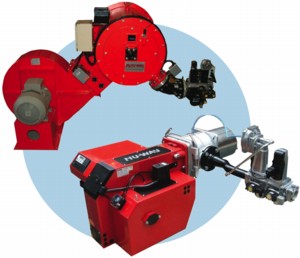Efficiency and low emissions start with good housekeeping

Modern burners and the technology they employ can play a crucial part in reducing emissions and energy consumption. Mike Baker looks at the latest techniques and products that can make such a big difference in keeping costs and emissions down.
With most heating equipment, the key to improving efficiency and reducing carbon emissions should always start with good housekeeping — and burners are no exception. Regular appliance servicing and maintenance will ensure maximum operating efficiency and reliability. Most of the leading burner manufacturers offer a range of spares and service contracts to suit all types of burner/boiler applications.
As with any heating and combustion equipment, it is critically important that all service or maintenance work is carried out by engineers who have been properly trained and are qualified. It can be tempting for the unqualified or inexperienced to try to undertake this themselves, but this is a recipe for potential disaster. Care must always be taken and, if in doubt, the equipment manufacturer can advise accordingly and provide a service engineer to call or arrange for the required training where appropriate.
When it comes to maintenance and identifying faults, electronic burner programmers offer an additional benefit, as many provide a fault history and improved diagnostics to aid the service engineer. This will ensure repair work can be carried out more easily and more quickly, so down-time will be reduced.
When looking to reduce costs and use less fuel, it is quite surprising how a small increase in efficiency can make a big difference. For example, an increase of just 1% in energy efficiency can reduce the fuel costs for a 500 kW natural-gas burner by up to £400 a year — corresponding to a CO2 reduction of about 1850 kg a year.
An important consideration is the burner control, either when the burner is first selected or when it is replaced. For example, a basic on/off (one stage) control may be acceptable for smaller burners up to 100 kW. However the additional cost of using improved control with high/low (2-stage) and modulation will easily be justified for larger burners.
Using high/low control instead of on/off can improve efficiency by up to 2%, with energy savings of about £800 a year and CO2 reduction of 3700 kg a year for natural gas or offering £1000 and 5300 kg a year for gas/oil.
Modulating controls can also improve efficiencies by a further 3 per cent compared to high / low, with savings of £1200 a year and CO2 reduction of 5500 kg a year with natural gas or £1600 and 7900 kg a year for gas oil.
Such controls regulate the number of times the burner has to start up and will also improve demand matching. Electronic burner programmers provide more precise modulating control of the air and fuel, increasing the repeatability of the air-fuel ratio and reducing air levels and flue losses.
There are also control techniques used on very large burners offering outputs of 5 MW and more, such as electronic valve positioning. In addition, using a variable-speed drive with the fan motor to supply air for combustion air and oxygen trim with smaller burners, can further increase efficiency by 3 to 7%.

At the highest level, a 5 MW natural gas burner with an efficiency improvement of 8% would provide energy and cost savings per annum of about £33 000 and 148 000 kg in reduced CO2 emissions. For gas oil burners this would translate to £43 000 and 212 000 kg.
The Government has been highlighting the benefits of utilising energy-efficient solutions wherever possible. Most specifiers, contractors and end-users will be aware that investing in technology to increase operating efficiency will reduce emissions and save money in the long term. That is why manufacturers have invested in research and development to ensure energy efficiency is taken into account when bringing new products to market.
Utilising a low NOx burner is another way of reducing emissions, and it has become easier to source equipment offering this benefit. In addition to lower nitrogen-oxide emissions, these technologies offer improve burner turndown and minimisation of fuel and air imbalances within the burner.
Taking all this into account, the importance of selecting equipment and controls with a higher efficiency is clearly something that should not be overlooked, and burners have a key role to play in reducing emissions and energy consumption.
Mark Baker is director of Nu-Way’s burner division.








